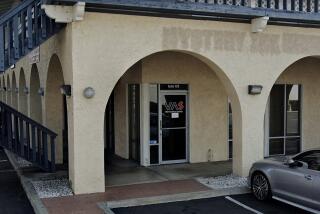Little Money Went for Children, City Says : Court Halts Fund-Raising by Alleged Charity
A San Diego organization that claimed to sponsor activities for handicapped children has been ordered to halt fund solicitations after an investigation revealed that less than 2% of the money it collected was used for children.
After a lengthy investigation, the consumer fraud division of the city attorney’s office obtained a Superior Court order against HOPES Foundation Inc. and its directors, Nicco and Joan Romano of San Diego, according to Steve Norton, an investigator in the city attorney’s office.
HOPES, an acronym for Honor, Opportunity, Pride, Employment and Success, was established several years ago to take disabled children on recreational trips to places such as Disneyland, Sea World and Universal Studios.
Norton said that the organization received as much as $6,000 a week through phone solicitations, with a weekly average of $5,000.
HOPES stopped its soliciting after receiving the court order Thursday and has no plans to restart because the directors cannot provide audit records requested by the court, according to David Kuhfal, attorney for the Romanos.
Norton said that records show that only about 1% of the money went to the children. Failure to reveal to potential donors the percentage of funds that went to the children is a violation of state codes, Norton added.
“Less than 2% of one’s contribution was actually applied to the charitable purpose,” Norton said. “That, in itself, is not against the law, but not stating it is.”
Kuhfal said that the city attorney’s figures are “greatly exaggerated.”
“I don’t know exactly what the figures are, but I know during the month of June they took 280 kids to Disneyland and spent over $28,000 on that trip alone,” he said.
Norton said HOPES employed 5 to 12 people to solicit donations over the phone. The employees were paid a commission, Norton said.
“If they (the employees) told how much was actually going to the kids, then they would not get a donation, and therefore they would not get a commission,” Norton said.
Most charitable organizations spend between 60% and 90% of their money on the cause for which they are soliciting, Norton said.
The city attorney’s office claims that 50% of HOPES donations went to pay its employees and 49% went directly to the Romanos.
Norton said he began investigating HOPES in 1984, after the consumer fraud division received calls questioning the validity of the organization.
A search warrant was issued in October, and the organization’s financial records were taken from its headquarters on North Park Way.
At the court hearing last week, written testimony was presented from former HOPES employees, Norton said.
“The testimony substantiated our allegations,” Norton said.
Kuhfal said that, although his clients were aware of the California Business and Professional Codes section regulating charitable organizations, they had a different interpretation than the city attorney’s office.
“They really worked as hard as they could to do this and they simply did not have the capacity to do it,” Kuhfal said.
“Kids got a lot of benefit from the organization, and a lot of money was spent on their behalf,” he said. “This was more a matter of mismanagement than someone ripping somebody off.”
More to Read
Sign up for Essential California
The most important California stories and recommendations in your inbox every morning.
You may occasionally receive promotional content from the Los Angeles Times.










